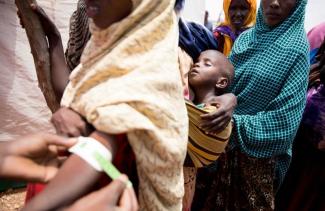Human-made catastrophes
Dangerous hunger

In March, the UN went on to warn that 20 million people in South Sudan, north-eastern Nigeria, Somalia and Yemen are at risk. It is even more worrying, that civil-society agencies are sounding the alarm about need spreading in about a dozen East and Central African countries without collapsed statehood being the reason. Masses require humanitarian aid as food security is dwindling in areas that are not haunted by the daily threat of violence. There are several, interrelated reasons, including the following:
For many months, draughts and floods have been destroying crops and devastating herds. Accordingly, there is less food, and incomes have been reduced. It is impossible to say that any single incident of weather is the direct result of climate change, but we know that climate change is making extreme weather more likely. We must assume that the phenomenon is contributing to the problems and should expect things to get worse if it continues.
In Africa, the population that needs to be fed is increasing fast. As a general rule, the average number of children a woman has is correlated to a country’s level of prosperity.
The problems are compounded by pests destroying crops and infectious diseases affecting people as well as animals. The weaker an organism becomes, the less able it is to withstand.
In war zones, combatants use need and hunger strategically. They burn fields, kill herds and poison wells. They make it hard or even impossible for humanitarian agencies to deliver aid. Even when fighting stops, moreover, matters cannot improve fast due to the destruction of infrastructure and indispensable assets such as seed, for example.
Throughout history, armed struggle has meant deprivation. On the other hand, growing need makes violent action more likely as tensions concerning scarce resources intensify. When masses of people feel forced to leave their homes in search of new livelihoods, societies become less stable, and good governance becomes less likely.
Worsening food insecurity in various African countries is an issue of global relevance. In our interconnected world, a severe crisis in one world region concerns all world regions. Famine is evidently incompatible with eradicating hunger, the fist Sustainable Development Goal (SDG).
It is depressing that humanitarian agencies report that they need more money than is being made available. Donor nations must rise to the challenges. In March, Berlin and London increased their spending on emergency relief, but nonetheless only about 20 % of the required $ 4.1 billion had been committed by 1 April. The governments of rich countries must do more, however, and they must pay attention to the underlying problems and contribute to solving them. Action to mitigate climate change and contributions to climate adaptation in developing countries are essential. Support for building infrastructure, institutions and peace is needed too.
Worried about refugees coming to their countries, European leaders are prone to saying that they want to “fight the reasons of flight”. This slogan makes sense, but one should not expect short-term results. The real challenge is not to limit the number of refugees crossing the Mediterranean Sea or coming to us on other routes. It is to provide decent livelihoods to everyone living to the south and east of that sea. Walls and border patrols do not solve the underlying problem of ensuring human rights and human security for all of humankind. What is needed is joint efforts to achieve the SDGs.
Hans Dembowski is editor in chief of D+C Development and Cooperation / E+Z Entwicklung und Zusammenarbeit.
euz.editor@fs-medien.de












